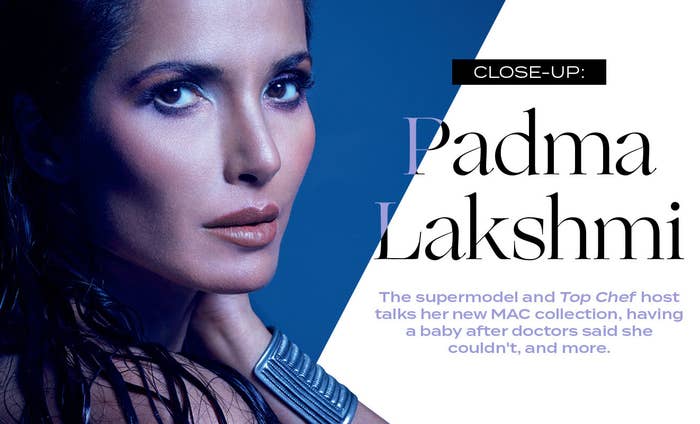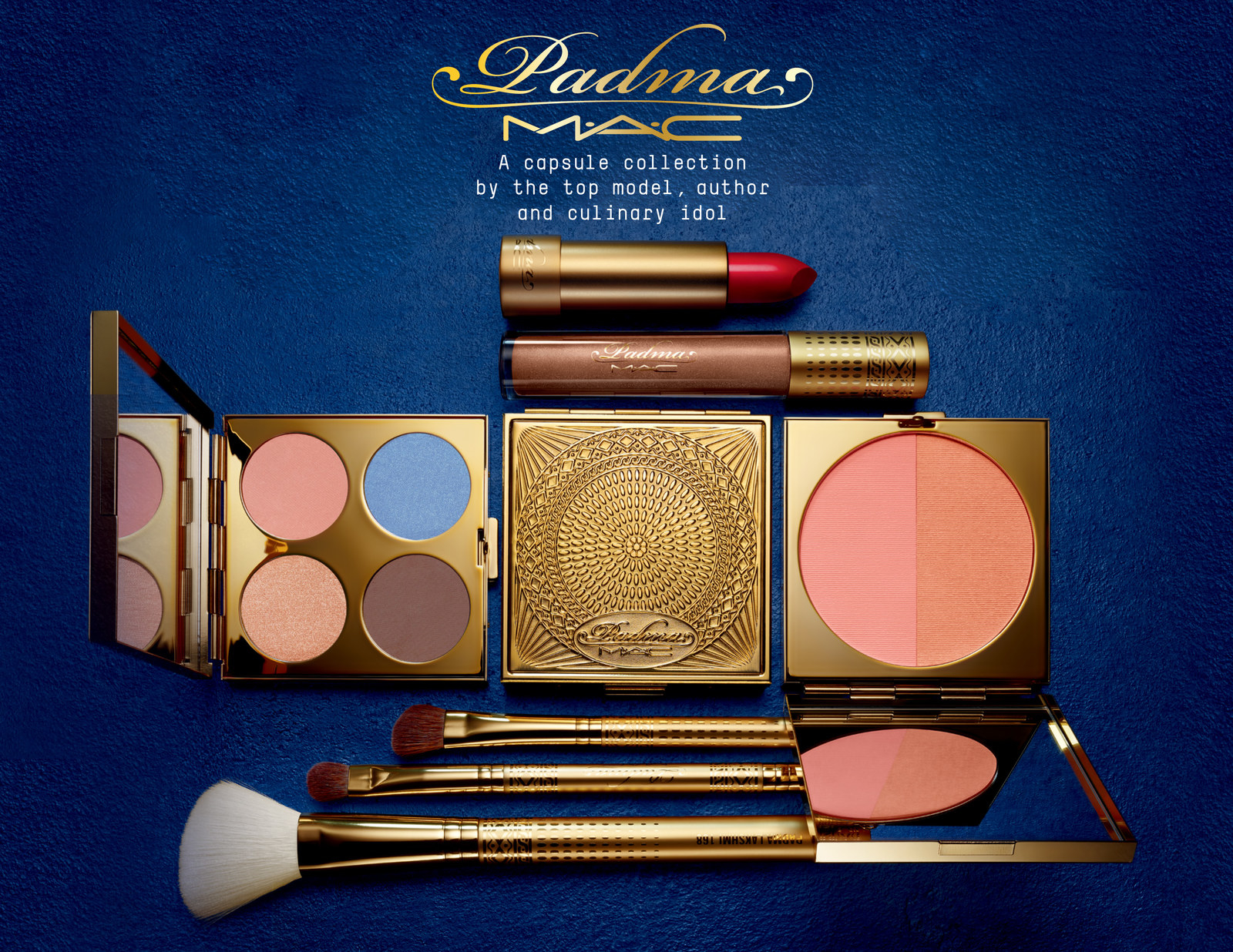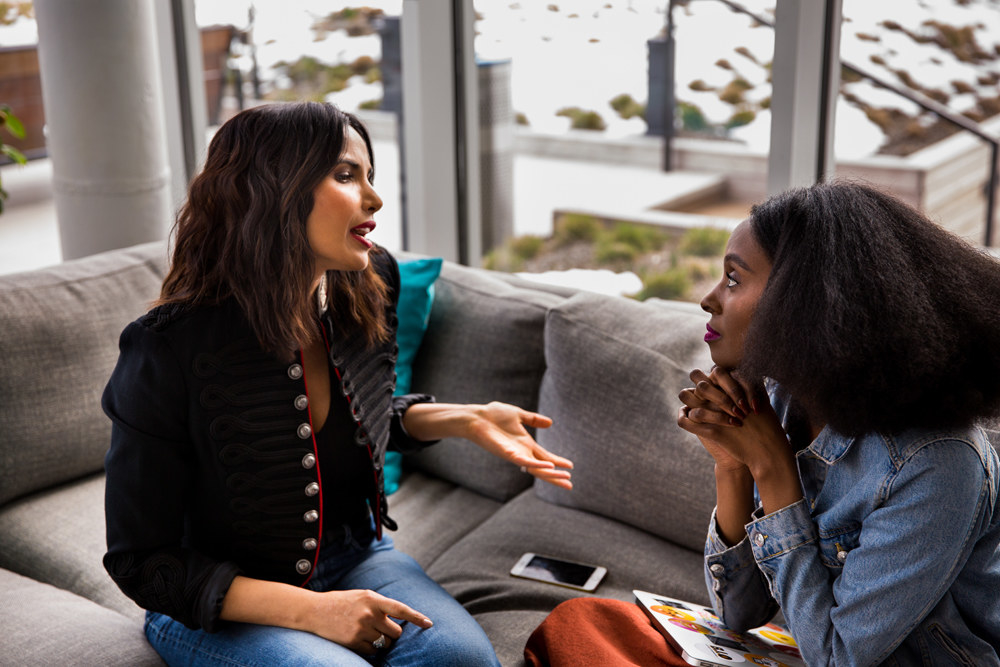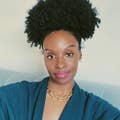
You know how you have impressions of people, especially celebrities, and then they turn out to be nothing like you imagined? Well that's how it was when I met with former supermodel and the host of Top Chef, Padma Lakshmi, at BuzzFeed HQ in New York.
Despite her charisma on TV and Instagram, I always pictured her as someone who'd be a little more restricted in person, kind of stoic, and media-trained to the point where her answers would sound like they were edited by a publicist but maintained a dash of voice for authenticity. Padma is an A-list celebrity, who also happens to be exceptionally stunning — even by model standards — so I wasn't expecting 'round-the-way-girl vibes. Had I read her memoir, Love, Loss, and What We Ate, before my sit-down with her, though, I would have known that my impression couldn't have been any further from the truth. (I highly recommend her book, by the way. All I'mma say is she has LIVED...like, love-triangle lived!)
There were a lot of takeaways from our chat, and one of them was that Padma keeps it a thousand and spills the tea! She's an open book, and generously shared her life experiences. We talked about her new capsule collection with MAC, and also her relationships, her endometriosis, and the miracle of having her daughter after doctors said she wouldn't be able to have children. Padma is officially the hella cool auntie you run to for advice on things you could NEVER talk to your mom about.

You have a new makeup collection with MAC, which is major! What's your favorite product?
You know, there are so many products I love, but I do love the two eyeshadow palettes. One is called Desert Dusk, which is beautiful. For daytime, there's a lovely light blue in there, but it has a little shimmer. So for medium and darker complexions, often when you wear baby blue it looks gray. It turns, and this one does not turn. It can be worn sheer or it can be worn more pigmented. If you have brown eyes and darker skin, purple is your friend. When I do a smokey eye, I actually do it just with the purple [in the 70's Sunset palette].
I'm obsessed with the packaging. Everything looks so regal, like luxury.
You know, for most women, the first gateway to splurging or doing something for themselves is not buying an evening gown. It's not even buying a designer purse. Because for a lot of people around the world, that is not available to them. The first thing that is a way for you to feel more beautiful is through makeup. So I wanted the packaging to feel really luxurious, really opulent. It's, you know, obviously influenced heavily by my Indian heritage.

In 2016 you did a video with Self, and you said you feel most comfortable in your skin when you're naked. I do too! So for you, what is it about being naked that you love the most?
There's so much done to us, and there's so much talk in media about who wore the best dress. And so much of it becomes artifice. Clothes are identity, so I dress all kinds of ways. But really, the essence of me is when I'm nude because there's no adornment. There's no, "do these jeans make me look heavy?" And I just feel more womanly and more myself then. There's no opinion layered on me by the fashion I'm wearing. And it took me a long time to feel comfortable in my own skin. In many ways, I feel more beautiful now at 47 than I did, certainly at 25 or 27. I'm sure my body was better back then because of, well, nature. At this point in my life, of course, I care about what I look like. I go to the gym, I make sure I have a nice outfit on or whatever. But all of that is less important to me than what I stand for and how I affect other people.
You have a scar on your arm from a car accident when you were a teenager, but your profession requires you to be so visible to the public. Did you ever think about surgery, and have agencies or managers tried to force you to cover it up?
I mean I was very good at covering my scar up because you gotta remember, I started modeling in the '90s and that was before Photoshop was so mainstream. I'm sure if it was the cover of Vogue they did a little tinkering, but you know, I got very good at finding products that covered up tattoos to cover up my scar. And it really was a long journey for me to feel okay. The car accident happened when I was 14. I've had several surgeries on it, and at various times the scar has looked different. I keloid — a lot of women of color keloid. I even perfected a really casual way to stand or sit so that you wouldn't see it.
But then at some point, it wasn't actually me. I was shooting with Helmut Newton, and he actually loved my scar. That was the thing that he thought made me the most special and cool to him. And all of a sudden, those same bookers that were checking my sleeves at fashion shows to make sure that I had long sleeves were now like, make sure she has a short sleeve because we want everyone to know it's her under all that hair and makeup. Because, you know, when you go down a runway it could be anybody, depending on how elaborate the hair and makeup is. And so it made me understand how arbitrary our notions of beauty are. I think our perception of what is beautiful and our whole outlook on what is acceptable and beautiful and feminine is expanding, and it's exciting for me because it's happened in my lifetime.
You've been very open about having endometriosis. What were your symptoms, and how did it affect your life?
Well, it affected my life in every way possible. Not only physical. It affected my emotional life. It affected my relationships. It affected my ability to work. Or, in the earlier days, to go to school. Endometriosis is a condition that affects 200 million women worldwide. It's a reproductive disorder that develops with your period. And literally, what endometriosis is, is when the uterus cannot expel its lining. And that lining is called the endometrium. Okay, so when a woman has her period, that lining, if she doesn't get pregnant, gets expelled by the body. And that lining is really juicy, fertile tissue because it's designed by Mother Nature to house an egg, an embryo, into a bouncing baby, right? It's to protect it, it's to nourish it, all of these things. So, when a woman's body can't get rid of it every month, it becomes reabsorbed, or it pools in the bottom of the reproductive cul-de-sac. And then it becomes reanimate, and it grows, and it attaches itself to all your inner organs and it wreaks havoc. It causes digestive problems. It causes lower back pain. It causes numbness in one leg. It causes headache, nausea, fatigue. It's very, very, very painful.
I went through this for 23 years. I got my period when I was 13, and I didn't get a proper diagnosis until I was 36. So 23 years, 12 months a year, one week out of each of those months — do the math. I was in bed, I was taking really heavy prescription pain medication, I was using a heating pad, I was having acupuncture, I was drinking teas, I was doing breathing exercises. Anything and everything I could. And if your mother or sister has it, you are seven times as likely to have it. And because you're used to seeing them in pain, you just expect it as your lot in life. And that's what my mother told me when she had that conversation. She said, "You know, some women get it, some women don't. It's just our lot in life. ... Try not to let it affect more of your life than it has to."
And that's what I did. I didn't want to use it as an excuse. I didn't want to be passed up for jobs. But on the other hand, I knew if my period was coming that week, that I couldn't take some swimsuit shoot in a faraway land because I was scared I was gonna leak through. And [endometriosis] comes on when a girl's period is there. So it's puberty, it's a time that's really vulnerable for all women and girls. And nobody wants to talk about their period; it's so personal, it's so private. It is, also, one of the reasons I think, that women are discriminated against. That, "Oh, you know, women are hormonal," "Women are, you know, hysterical." Well, we're just in pain. You know, the word hysteria comes from [hysterika], which is an ancient Greek word for the uterus. And it's because we didn't understand it.
Pain is your body's way of telling you something is wrong, and I've gone to so many doctors. I've even had a surgery where the doctor just said, "Oh, you had a cyst." Okay, that's the truth, but he never said to me, "You have a condition called endometriosis. It is something you need to monitor, and it's something you need to check every few years. And it will diminish the quality of your life significantly. It is dangerous to your health, and it may make you infertile." None of that was said to me, and I went to a really good gynecologist, who I'm sure was very well meaning. There's hormonal treatment. There's treatment through laparoscopic surgery. Once I got on the other side of my diagnosis and a year had gone by after I had all the surgeries, I saw what life was like for normal women. And I went from being relieved and happy, to actually being angry and enraged because I could've had this surgery in college.
In your book, Love, Loss, and What We Ate, you get really candid about your relationships, including a love triangle where you dated two guys, a relationship with a woman once, a previous marriage. You're basically a relationship expert. What's the greatest advice you could give someone in a relationship?
That's hard. The one thing I would say is put yourself first, and determine whether the person you're with is someone you would stop doing everything for. I know that seems contradictory. Because if they're not, and if you really don't love them enough, don't waste your time. At the end of the day, you want someone who supports you and who wants the best for you; not just the best for the relationship. And that should be true for yourself too. We all tend to stay in relationships too long because we want it to work. You know within the first six months of a relationship whether it's gonna work or not. And maybe it can work at another time because you guys will be mature and at a different stage. Wait till that other time. Don't stick with that person.

You come off very confident, self-assured. Is there anything that you would change about yourself?
I think I talk too much. That's why the book was good, because I could put it all in a book and somebody else could edit it and make sure I wasn't putting my foot in my mouth. I think I tend to get excited and passionate and stuff, and I think I would like to work on that.
You said you feel most comfortable when you're naked. Is there a specific moment in your life that you felt like your most beautiful self, or your most happy self?
In the OR when my child was born, because I was told I couldn't have children because of my endometriosis. I don't have a right fallopian tube; they took it away. I don't have part of my left ovary; they took it out. So the fact that I even have a child is miraculous. And when I heard the little cry — you know, it's not, like, in the movies. It sounds like a little kitten mewing. I heard that, and they brought the baby to me. I just, I felt my heart burst, you know? And that was when I felt more beautiful, more than any time when I've been really skinny or have my makeup on point. Because I realized that life is really not about me or what I look like.

Padma Approved:
MAC Eyeshadow Desert Dusk. Get it from MAC for $33.
MAC Eyeshadow 70's Sunset. Get it from MAC for $33.
MAC Powerpoint Eye Pencil in Boredeauxline/Molé Brown. Get it from MAC for $18.50.
MAC Lipstick in Apricot Gold. Get it from MAC for $17.50.
Love, Loss, And What We Ate. Get it from Amazon for $11.30.
